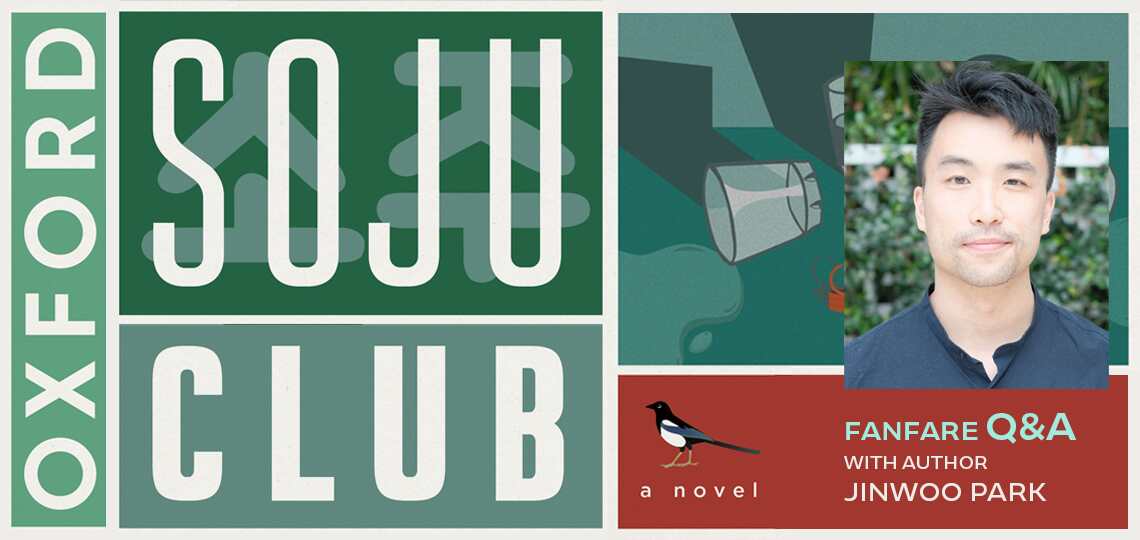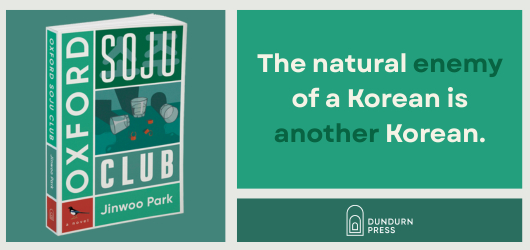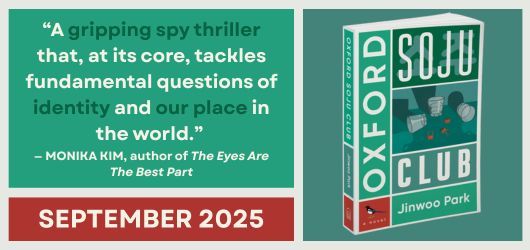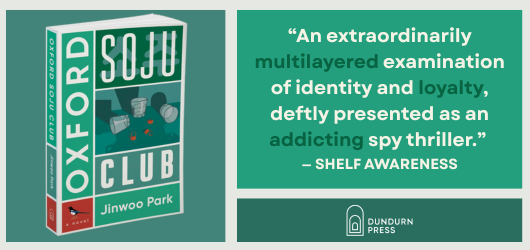"This book was how I resolved my issues regarding identity": Jinwoo Park on his debut novel Oxford Soju Club

Reviewer Ryan Prado Interviews Jinwoo Park, Author of Oxford Soju Club
For all the contention about immigration among First World nations, it’s important to remember that our species has migration in its DNA. Out of Africa, humans have always, always been on the move—legions of anthropologists have helped us understand why and how.
But what’s less well known is the different ways the immigration experience affects the inner life of the expatriate because they face enormous pressure to conform in speech and dress, food preferences and cultural traditions. In other words, in the search for identity in a new country, what should be left behind?
Today, Jinwoo Park is with us to talk about Oxford Soju Club, his new thriller that explores the complexities Korean immigrants face as they seek new identities in the West—even as his cast of North and South Korean characters hunt each other through the streets of Oxford under the anxious eyes of CIA agents.
The book earned a highly complimentary review from Ryan Prado in Foreword’s September/October issue. Knowing Jinwoo himself to be a Korean immigrant, we jumped at the chance to connect reviewer and author for a thoughtful conversation about identity, both lost and found.
This is your debut novel, but it feels like this is a story that perhaps you’ve carried with you for a long time. How much of your own tribulations with identity as a Korean living in the West did you tap into when thinking about writing Oxford Soju Club?
I’d say that I’ve tapped into pretty much all the tribulations I’ve had as a Korean immigrant. Throughout my life in Canada, US, and the UK, I’ve been different versions of myself in my various attempts to adapt. Whether I was trying to be the model minority archetype, or totally embracing the Korean side of myself, or performing rituals for the sake of solidifying my footing, like being a hockey fan (for which I have no actual affection for). I was essentially putting on different masks to see which one would work better for me to adjust and conform.
At the same time, I was constantly gauging how I was being received by others whenever I was putting on these masks. I found out which performance acts would gain validation. Talking about hockey, as cliched as it is, was a very easy way to look like I belonged, though once again, I don’t like hockey all that much. So it was actually quite difficult to keep these masks on. A lot of my youth and my twenties were spent this way. And though Korean culture is quite widely known now, before it was just a novelty. I remember when Gangnam Style came out, a lot of people would ask me if I knew the dance, pressure me into doing the dance, and sometimes I did it. I hated it. It always felt like people saw my Korean side like they were seeing a rare breed of bird. So I’d hide that side of me often, only taking it out when it clearly advantaged me, like knowing what’s good on the menu at a Korean restaurant, or how to mix soju and beer in the right ratio.
It wasn’t until I started writing this book that I properly reflected on how I was viewing my identity as a Korean living in Canada. In many ways, this book was how I resolved a lot of my issues regarding identity. By putting it all down on paper and expressing myself through my characters, I was able to forge a path forward that was truly me, and express my Korean identity in the way that really felt genuinely me. And that includes refusing to do the Gangnam Style dance when anyone asks.
There is an emphasis on the various social masks, political masks, and emotional masks at play in Oxford Soju Club that elevate it from pure spy novel to something more psychological—a cunning that serves the characters’ professional duties, but also helps reveal their personal reflections on who they are themselves, as well as their perceived rivals or enemies. In what ways did you hope to examine the thin line between those varied deliberations?
Something that I’ve always thought that never seemed to get much attention was internal conflicts within immigrant communities. The most painful betrayals my family experienced in Canada have been from other Koreans. In fact I think all of the betrayals were from other Koreans. I’ve seen this happen very routinely. The Korean community, whether it’s in Vancouver, or Toronto, it’s just a big ball of drama where
people are incessantly backstabbing each other. They come to you with the mask of being an ally, a fellow Korean, while hiding the fact that they’re targeting you because you’re easier prey to exploit exactly for that assumed loyalty and faith.
This is what people outside of the communities often don’t see. It’s so obvious to point at the racially noticeable disputes between Asians and non-Asians. But it’s more complicated to look at what’s actually happening within the communities, and how the environment of the immigrant community sets the stage for deep conflicts. From my experience, the masks that we wear often were not for the majority, but to fend off against other minorities or your own people. And I wanted to really examine that. Why are we so cruel to our own kind? Why do we insist on hiding ourselves to those who should naturally be closer to us? I’m not sure if I have the answers yet, but I do feel more clear-minded about it.
There is a shift at chapter 7 where the book’s sections change from being titled for “The Northerner,” “The Southerner,” and “The American” to “The Exiled,” “The Rejected,” and “The Nameless,” ostensibly for the same characters’ introduction for each passage. Here, you experiment again with identity, and you volley throughout the book between the many names your characters have taken on as part of their espionage duties. Were you ever worried about the clarity being muffled in terms of who was talking to who at specific times, or even which voices you were writing for?
I think the entire time I had a clear understanding of who was going through what kind of transformation throughout the book, and partly that was why I named them in such ways. I knew exactly why I was making that shift at chapter 7. Because I’ve seen how in the face of duress, we’re able to see who we are more clearly. On paper we are Korean-Canadians, but underneath, we are often exiles, rejects, having to hide our true identities so that it’s more palatable to our adopted societies. In that sense, we can also be nameless. Plus, each of those section titles are deeply related to the arc of the characters they are attached to.
Now, if it’s about whether I was worried if it would get muddied for the reader, I don’t think I was ever concerned about that either. I know the people who understand will understand. I have faith that those who have had the experiences that I’m drawing from, will see why I did what I did. And for those who may not as readily understand, I wanted to give a glimpse of what it’s like to be an immigrant, to have our identities twisted and turned, sometimes against our will.
I’ve been told that the shifting narratives are confusing, but in my perspective, the confusion is a feature if
anything. It reflects how suddenly you can turn into a different identity in the eyes of the other. One moment you’re an ally, next thing you know, you’re seen as an enemy. It’s the quintessential hypocrisy of the model minority narrative. As soon as we are not within those narrow confines, we’re cast aside. In fact, I hope that these shifts invite more people to ask questions about why the book does this. I hope it’s not confusion people feel, but curiosity.
What was it about Oxford as a central setting that inspired you to use it for the book? I understand you went to grad school at the University of Oxford, graduating in 2015. Were there certain social nuances in the city that pulled you there as opposed to, say, Montreal, where you live now?
Oxford was a strange place. It never felt like a city, but instead a small town that had been forced to hold up a burden it was never meant to. You’d see these double-decker buses squeezing their way through the narrow streets, and so many times you could almost touch the second floor windows of buildings next to the roads if you just reached your hand out. And in many ways, I felt like Oxford was a place resistant to change.
Montreal has its old parts, of course, but it is a dynamic city. It changes constantly. And that wasn’t just about the old buildings and the cobblestone paths. It was also about the culture it was exuding. I always felt like I was out of place there, because it seemed to me that in order to belong, you needed to give the right answers. And I never had the right answers, though I really tried. I’d often wear suits because I thought that would help me look the part.
But no matter how much I tried to control myself, my facade would always break down. At a seminar while we were talking about film criticism, I was blabbing about Raid 2 and how I loved martial arts films. Of course, that would sound so stupid compared to others who had these eloquent responses about the artistry of films. Stuff like that happened constantly.
But I wasn’t really conscious of these things until I moved to Montreal after graduating from Oxford. Montreal’s a great place. You can be who you want to be, and you’ll be largely left alone. There’s a live and let live culture in Montreal that doesn’t demand anyone to be anything, in general that is. So when that kind of pressure was lifted off of me, I was able to properly reflect on my time in Oxford, and it really felt like I had played a character while I was there. Like, I wasn’t myself while I was there, and just put up this image of a wannabe academic just to try to fit in. And I guess that’s why I set the stage in Oxford and kept it there. Because that was where I lost my sense of what I was.
You write beautifully about Korean food and drink, through Jihoon’s restaurant, with soju being an obvious focal point throughout. There are strong relationships between cultures all over the world and their cuisine. I wonder how much you were intending for some of the rich and detailed passages about food to come across as an anchor or buoy for the characters’ complicated tethering to Korea?
Food has been one of the main channels of how I’ve expressed my Korean identity. When I taste Korean food, there’s this feeling of home, of familiarity so primordial, that it reminds me that I am inexplicably Korean after all. It’s also not just about the food. It’s about how I eat the food. For example, I love to gulp down spoonfuls of boiling soup and feel it burn through my throat. It’s such a refreshing sensation. That’s a very Korean thing to do.
And I think that’s what it also does for the characters in the book as well. It is the one thing that instinctively connects them to their home culture. It’s a place of comfort that asks for no other condition than to just nourish yourself. It’s why the restaurant in the book is almost like a haven for all three characters. No matter your background, no matter what sort of relationship you have to Korea, the food brings them together.
What are some examples of other cultural and social nuances that the writing of this book brought up for you that you remember from being raised in Seoul? Whether they were ancillary to the story or more peripheral, were there specific memories that helped to frame the story more clearly in your mind as you wrote it?
My parents both worked when I was a little kid, so I was raised by my grandmother on my mom’s side. She had come up from the countryside and started living with us in Seoul to take care of me and my younger sister. When we moved to Canada, we practically lost touch with her, and she lived alone until the day she passed away. I couldn’t attend the funeral because I had exams, but the news of her death woke something up in me, and that was when I realized just how much I missed her. I felt like a small part of me was left with her in Korea. And while Yunah’s own grandmother in the book is heavily based on my own grandmother, the contemplation of home from afar throughout the novel is partly a result of the reflections I’ve done on how I felt about my grandmother.
Of course, there are more peripheral parts too, like all the folktales I grew up with about how magpies bring good fortune. Though I’m not sure if the magpie (in the form of the pub) in the book brought any good fortune. I guess I just like magpies.
I have seen you describe Oxford Soju Club as a “therapy novel” that helped you navigate through some unresolved traumas through writing it. In what ways do you feel like the completion and publication of this novel has freed you to tell other stories that speak to the resolve you’ve experienced?
Around the time I had started writing Oxford Soju Club, I was in a difficult place. I felt like all I had done until that point was just fail repeatedly. I had been so confused throughout practically all of my twenties, not knowing what I should do, all the while knowing what I actually wanted to do. And what I wanted to do was write stories like this book.
I wanted a fresh start. A clean slate to rewrite my life’s narrative. So I infused into the book all of my inner struggles, the dialogues I was having with myself, the issues I was wrangling with. And that’s why many of the characters are avatars for myself or the people in my life. Almost every single event in the book, in one way or another, represents something that happened in my own life. And working it out on the page, seeing how they were resolved, allowed me to get closure on those issues. Things like, is it necessary for me to live up to my parents’ expectations? Is that something that I must do, or otherwise be considered as a failure all my life? Or, do I need to keep using an English name to make it easier for others to pronounce it (back then I was known as Alex), or should I just be Jinwoo?
So writing the book was a process of disentangling those threads. One by one, I could see the answers that I really needed to hear become more fully me. And it was only in the last moment of the book that I found a sense of peace with myself. Now that I’ve poured everything out into the book, and that I had come out on the other side of my forest of traumas, I could move on. So in many ways, this novel was a necessary one for me. I could even say that it saved me.
Ryan Prado



